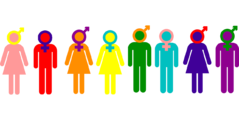By Anna-Sofia Takala, Year 11
On the second day of the Student League of Nations, the resolution presented by Belgium was one that spoke in favor of respect, rights and education for the LGBT community. Belgium wanted to amend the Universal Declaration of Human Rights to include the community and show that discrimination on the basis of sexuality should be an offense that is harshly punished. The resolution stated that any country that fails to do so should be expelled from the United Nations. It followed to say that the 77 countries with discriminatory laws must revoke them – these laws refer to marriage, taxation, employment etc; and the 5 countries with death penalties must remove the penalty.
The hardest moment at the Student League of Nations General Assembly was watching how nation after nation denied the human rights advocating for sexual identity, denying an entire group respect, existence, even life.
Today in many countries the LGBT community is finally being regarded as a real community. Gay marriage has been legalized in 26 different countries around the world, and advancements in their rights are being made every day. The world has come far in this regard. However, the LGBT community is still harshly discriminated against. In some places they are even being denied existence and recognition. This was all clearly shown at SLN.
There were obvious flaws within the resolution, such as how non-compliant countries would be expelled from the UN. In the history of the United Nations, no country has ever been expelled for not having followed through with a resolution. This makes the resolution problematic, since it should then go on to include gender, religion, ethnicity etc. For such a strong penalty, the resolution would have to cover discrimination in general, rather than a single form of discrimination. We asked the delegates why they then made their resolution so harsh: they said it was in order to spark a debate. Though they were successful in this, it was clear that it eroded support from countries who could have been for it, had the original resolution been perhaps more diplomatic.
The debate leaned very heavily against the resolution. Most countries with strongly religious cultures stated that it went directly against their beliefs and that the LGBT community was sinful. Some even went so far as to say they cannot give rights to a group whose existence they don’t acknowledge. This led to the final resolution being heavily amended, making it a goal rather than a real change, but even then the final vote stood at 38 for, and 62 against.
In the eyes of Ecolint, this was a step back. Ecolint is an institution that advocates respect, tolerance and unity. The foundation was created by the UN, which meant that from its very inception, human rights were included. Acceptance is in our roots here. In this regard, the final vote stood directly against our views, our values and our beliefs.
We spoke to Dr David Hawley, and asked him about his thoughts as Director General, on how this resolution resolved, from the perspective of Ecolint;
“The principle would go against the values of Ecolint, absolutely, because the spirit of Ecolint in the simplest way is one of inclusion, and anything that leans towards exclusion would not be welcomed at Ecolint. So my sense is yes, the way it was resolved goes against the values of Ecolint. The resolution was a little ahead of its time, but be sure, it’s coming.”



